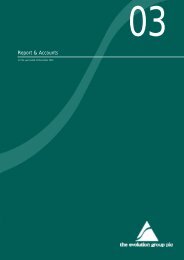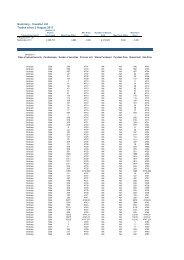Annual Report for the year ended 31 December 2008
Annual Report for the year ended 31 December 2008
Annual Report for the year ended 31 December 2008
You also want an ePaper? Increase the reach of your titles
YUMPU automatically turns print PDFs into web optimized ePapers that Google loves.
principal risks and uncertainties<br />
The Audit Committee reviewed <strong>the</strong> key risks facing <strong>the</strong> Group and <strong>the</strong><br />
controls that have been put in place to mitigate <strong>the</strong>m. Changes to <strong>the</strong><br />
risk environment were highlighted, as were improvements to <strong>the</strong> control<br />
structure: most notably in <strong>the</strong> restructuring of <strong>the</strong> Compliance Function,<br />
<strong>the</strong> introduction of an <strong>Annual</strong> Compliance plan, approved by <strong>the</strong> Board<br />
and <strong>the</strong> introduction of enhanced governance structures below Board<br />
level at WdB.<br />
Reputational risk<br />
Reputational risk is <strong>the</strong> risk of damage to <strong>the</strong> Group’s image as a result<br />
of <strong>the</strong> inability to retain and generate business due to adverse public<br />
opinion. The Board has established policies and procedures that provide<br />
direction on managing reputational risk focusing on reducing loss of<br />
confidence amongst existing and potential customers, investors,<br />
suppliers, and supervisors.<br />
Retention of staff<br />
The retention of highly skilled staff, as well as <strong>the</strong> ability to attract new<br />
staff with <strong>the</strong> right capabilities and experience is central to <strong>the</strong> efficiency<br />
and sustainability of <strong>the</strong> Groups’ operations. The Group mitigates <strong>the</strong><br />
risk of loss of key staff through its employment policies, remuneration<br />
and benefits packages which are designed to be competitive with o<strong>the</strong>r<br />
companies, as well as providing staff with motivating and fulfilling career<br />
opportunities. The Group supports <strong>the</strong> principles set out in <strong>the</strong> FsA’s<br />
code of best practice on remuneration policies issued in February 2009.<br />
Major infrastructure incident<br />
There is a risk that any incident <strong>the</strong> Group is involved in, directly or<br />
indirectly could cause possible damage to <strong>the</strong> Group’s or key vendors<br />
infrastructure which in turn would also affect <strong>the</strong> Group’s reputation or<br />
cause financial loss. The Group has in place controls to maintain <strong>the</strong><br />
integrity and efficiency of its systems, while ensuring <strong>the</strong> sustainability<br />
of operations despite a significant disruption. The Group continuously<br />
reviews its business continuity planning, and has disaster recovery<br />
facilities in order to mitigate any substantial disruption to its operations<br />
caused by events such as acts of terrorism and natural disasters.<br />
Financial crime<br />
This is <strong>the</strong> risk that <strong>the</strong> Group suffers a loss from fraud. This could be<br />
through <strong>the</strong> deliberate over-riding of internal controls or through an<br />
external party successfully overcoming <strong>the</strong> Group’s controls (eg through<br />
identity <strong>the</strong>ft). The FsA in its annual financial risk outlook highlighted<br />
that firms may be at greater risk of financial crime due to <strong>the</strong> current<br />
economic stresses at <strong>the</strong> individual and corporate level. The Group<br />
believes that it has sufficient controls in place to mitigate <strong>the</strong> risk of<br />
financial crime. Never<strong>the</strong>less, <strong>the</strong> compliance department is undertaking<br />
a review of <strong>the</strong> current controls in place throughout <strong>the</strong> Group to ensure<br />
controls are robust and to determine where improvements can be made.<br />
Regulatory risk<br />
The Group’s principal business subsidiaries are all regulated entities.<br />
Recent statements by <strong>the</strong> FsA, <strong>the</strong> results of <strong>the</strong> Turner report and <strong>the</strong><br />
likely outcome of <strong>the</strong> <strong>for</strong>thcoming Walker report all point to a financial<br />
services regulatory environment that is becoming increasingly challenging.<br />
The Group’s philosophy is to ensure compliance at all times. There is,<br />
however, always a risk of regulatory action given <strong>the</strong> markets in which<br />
<strong>the</strong> Group operates including its private client business which is expanding<br />
its client base and where <strong>the</strong> FsA is demonstrating an increasing focus<br />
on <strong>the</strong> fair treatment of customers and <strong>the</strong> governance arrangements<br />
surrounding this. Fur<strong>the</strong>rmore, <strong>the</strong>re are regulatory risks relating to <strong>the</strong><br />
FsA increasing focus on regulatory reporting within our securities business.<br />
The Audit Committee considered whe<strong>the</strong>r <strong>the</strong>re had been any material<br />
failings or weaknesses in <strong>the</strong> internal controls of <strong>the</strong> Group and in doing<br />
so considered <strong>the</strong> results of <strong>the</strong> FsA ARROW visit in september <strong>2008</strong>.<br />
The visit focused upon certain matters already under review by <strong>the</strong> Group<br />
and with our internal auditors including <strong>the</strong> governance and committee<br />
structures below Board level. in line with <strong>the</strong> FsA’s continuing treating<br />
customers fairly (TCF) initiative, <strong>the</strong> ARROW visit also focused on treating<br />
customers fairly and portfolio suitability within WdB.<br />
Detailed discussions with <strong>the</strong> FsA on <strong>the</strong> results of <strong>the</strong> ARROW visit are<br />
continuing. However, <strong>the</strong> Group has increased <strong>the</strong> resources employed<br />
in and accelerated its review and remediation work on customer files<br />
with third party help. in line with <strong>the</strong> continuing project to enhance<br />
systems and reporting in WdB it has also committed to considerable<br />
investment in a bespoke management in<strong>for</strong>mation system.<br />
Market risk<br />
The Group, through Esl, holds positions in equities which are subject to<br />
price fluctuation. There is <strong>the</strong>re<strong>for</strong>e a risk that Esl will suffer a loss in<br />
<strong>the</strong> event of a significant market correction. positions are subject to<br />
limits that are independently monitored by <strong>the</strong> risk department. Fur<strong>the</strong>r<br />
details on financial risk management can be found in note 2 – financial<br />
instruments and risk management to <strong>the</strong> accounts.<br />
results and dividends<br />
During <strong>the</strong> <strong>year</strong> <strong>the</strong> Group made a loss after tax from continuing<br />
operations of £13,496,000 (2007: profit £3,202,000).<br />
The profit <strong>for</strong> <strong>the</strong> <strong>year</strong> <strong>ended</strong> <strong>31</strong> <strong>December</strong> <strong>2008</strong> of <strong>the</strong> Company amounted<br />
to £2,167,000 (2007: profit £762,000). The Directors recommend <strong>the</strong><br />
payment of a final dividend <strong>for</strong> <strong>the</strong> <strong>year</strong> of 1.27p per ordinary share (2007:<br />
1.25p). if approved, <strong>the</strong> final dividend will make <strong>the</strong> total dividends <strong>for</strong><br />
<strong>the</strong> <strong>year</strong> 2.02p (2007: 1.92p) following <strong>the</strong> payment of <strong>the</strong> interim dividend<br />
of 0.75p per ordinary share on 24 October <strong>2008</strong>. The dividend is payable<br />
on 22 May 2009 to shareholders on <strong>the</strong> register on 24 April 2009.<br />
post balance sheet events<br />
Details of significant post Balance sheet events are set out in note 36<br />
to <strong>the</strong> accounts and in <strong>the</strong> principal activities and business review<br />
section of this Directors’ <strong>Report</strong>.<br />
Directors<br />
The Directors of <strong>the</strong> Company, who held office since 1 January <strong>2008</strong><br />
(<strong>the</strong>re were no appointments or resignations of Directors during <strong>the</strong><br />
<strong>year</strong> up to <strong>the</strong> date of this report), unless o<strong>the</strong>rwise stated, are as<br />
shown below:<br />
Martin Gray (Non-executive Chairman)<br />
Alex snow (Chief Executive Officer)<br />
Andrew umbers (Executive Director)<br />
lord Maclaurin of Knebworth, Dl (senior Non-executive)<br />
Nicholas irens (Non-executive)<br />
Mark Nicholls (Non-executive)<br />
peter Gibbs (Non-executive)<br />
We have made very good progress<br />
WiTh The inTegraTion and developmenT<br />
of each of our businesses.<br />
19



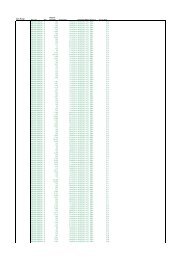
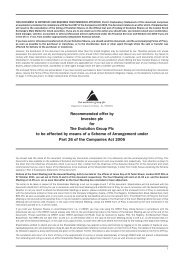

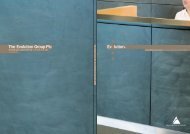
![2. Front continued [c87307] - The Evolution Group PLC](https://img.yumpu.com/19604468/1/184x260/2-front-continued-c87307-the-evolution-group-plc.jpg?quality=85)
